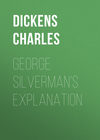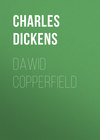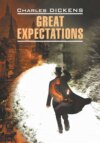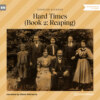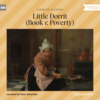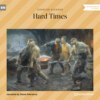Czytaj książkę: «George Silverman's Explanation», strona 3
SIXTH CHAPTER
Brother Hawkyard (as he insisted on my calling him) put me to school, and told me to work my way. ‘You are all right, George,’ he said. ‘I have been the best servant the Lord has had in his service for this five-and-thirty year (O, I have!); and he knows the value of such a servant as I have been to him (O, yes, he does!); and he’ll prosper your schooling as a part of my reward. That’s what he’ll do, George. He’ll do it for me.’
From the first I could not like this familiar knowledge of the ways of the sublime, inscrutable Almighty, on Brother Hawkyard’s part. As I grew a little wiser, and still a little wiser, I liked it less and less. His manner, too, of confirming himself in a parenthesis, – as if, knowing himself, he doubted his own word, – I found distasteful. I cannot tell how much these dislikes cost me; for I had a dread that they were worldly.
As time went on, I became a Foundation-boy on a good foundation, and I cost Brother Hawkyard nothing. When I had worked my way so far, I worked yet harder, in the hope of ultimately getting a presentation to college and a fellowship. My health has never been strong (some vapour from the Preston cellar cleaves to me, I think); and what with much work and some weakness, I came again to be regarded – that is, by my fellow-students – as unsocial.
All through my time as a foundation-boy, I was within a few miles of Brother Hawkyard’s congregation; and whenever I was what we called a leave-boy on a Sunday, I went over there at his desire. Before the knowledge became forced upon me that outside their place of meeting these brothers and sisters were no better than the rest of the human family, but on the whole were, to put the case mildly, as bad as most, in respect of giving short weight in their shops, and not speaking the truth, – I say, before this knowledge became forced upon me, their prolix addresses, their inordinate conceit, their daring ignorance, their investment of the Supreme Ruler of heaven and earth with their own miserable meannesses and littlenesses, greatly shocked me. Still, as their term for the frame of mind that could not perceive them to be in an exalted state of grace was the ‘worldly’ state, I did for a time suffer tortures under my inquiries of myself whether that young worldly-devilish spirit of mine could secretly be lingering at the bottom of my non-appreciation.
Brother Hawkyard was the popular expounder in this assembly, and generally occupied the platform (there was a little platform with a table on it, in lieu of a pulpit) first, on a Sunday afternoon. He was by trade a drysalter. Brother Gimblet, an elderly man with a crabbed face, a large dog’s-eared shirt-collar, and a spotted blue neckerchief reaching up behind to the crown of his head, was also a drysalter and an expounder. Brother Gimblet professed the greatest admiration for Brother Hawkyard, but (I had thought more than once) bore him a jealous grudge.
Let whosoever may peruse these lines kindly take the pains here to read twice my solemn pledge, that what I write of the language and customs of the congregation in question I write scrupulously, literally, exactly, from the life and the truth.
On the first Sunday after I had won what I had so long tried for, and when it was certain that I was going up to college, Brother Hawkyard concluded a long exhortation thus:
‘Well, my friends and fellow-sinners, now I told you when I began, that I didn’t know a word of what I was going to say to you (and no, I did not!), but that it was all one to me, because I knew the Lord would put into my mouth the words I wanted.’
(‘That’s it!’ from Brother Gimblet.)
‘And he did put into my mouth the words I wanted.’
(‘So he did!’ from Brother Gimblet.)
‘And why?’
(‘Ah, let’s have that!’ from Brother Gimblet.)
‘Because I have been his faithful servant for five-and-thirty years, and because he knows it. For five-and-thirty years! And he knows it, mind you! I got those words that I wanted on account of my wages. I got ’em from the Lord, my fellow-sinners. Down! I said, “Here’s a heap of wages due; let us have something down, on account.” And I got it down, and I paid it over to you; and you won’t wrap it up in a napkin, nor yet in a towel, nor yet pocketankercher, but you’ll put it out at good interest. Very well. Now, my brothers and sisters and fellow-sinners, I am going to conclude with a question, and I’ll make it so plain (with the help of the Lord, after five-and-thirty years, I should rather hope!) as that the Devil shall not be able to confuse it in your heads, – which he would be overjoyed to do.’
(‘Just his way. Crafty old blackguard!’ from Brother Gimblet.)
‘And the question is this, Are the angels learned?’
(‘Not they. Not a bit on it!’ from Brother Gimblet, with the greatest confidence.)
‘Not they. And where’s the proof? sent ready-made by the hand of the Lord. Why, there’s one among us here now, that has got all the learning that can be crammed into him. I got him all the learning that could be crammed into him. His grandfather’ (this I had never heard before) ‘was a brother of ours. He was Brother Parksop. That’s what he was. Parksop; Brother Parksop. His worldly name was Parksop, and he was a brother of this brotherhood. Then wasn’t he Brother Parksop?’
(‘Must be. Couldn’t help hisself!’ from Brother Gimblet.)
‘Well, he left that one now here present among us to the care of a brother-sinner of his (and that brother-sinner, mind you, was a sinner of a bigger size in his time than any of you; praise the Lord!), Brother Hawkyard. Me. I got him without fee or reward, – without a morsel of myrrh, or frankincense, nor yet amber, letting alone the honeycomb, – all the learning that could be crammed into him. Has it brought him into our temple, in the spirit? No. Have we had any ignorant brothers and sisters that didn’t know round O from crooked S, come in among us meanwhile? Many. Then the angels are not learned; then they don’t so much as know their alphabet. And now, my friends and fellow-sinners, having brought it to that, perhaps some brother present – perhaps you, Brother Gimblet – will pray a bit for us?’
Brother Gimblet undertook the sacred function, after having drawn his sleeve across his mouth, and muttered, ‘Well! I don’t know as I see my way to hitting any of you quite in the right place neither.’ He said this with a dark smile, and then began to bellow. What we were specially to be preserved from, according to his solicitations, was, despoilment of the orphan, suppression of testamentary intentions on the part of a father or (say) grandfather, appropriation of the orphan’s house-property, feigning to give in charity to the wronged one from whom we withheld his due; and that class of sins. He ended with the petition, ‘Give us peace!’ which, speaking for myself, was very much needed after twenty minutes of his bellowing.
Even though I had not seen him when he rose from his knees, steaming with perspiration, glance at Brother Hawkyard, and even though I had not heard Brother Hawkyard’s tone of congratulating him on the vigour with which he had roared, I should have detected a malicious application in this prayer. Unformed suspicions to a similar effect had sometimes passed through my mind in my earlier school-days, and had always caused me great distress; for they were worldly in their nature, and wide, very wide, of the spirit that had drawn me from Sylvia. They were sordid suspicions, without a shadow of proof. They were worthy to have originated in the unwholesome cellar. They were not only without proof, but against proof; for was I not myself a living proof of what Brother Hawkyard had done? and without him, how should I ever have seen the sky look sorrowfully down upon that wretched boy at Hoghton Towers?
Although the dread of a relapse into a stage of savage selfishness was less strong upon me as I approached manhood, and could act in an increased degree for myself, yet I was always on my guard against any tendency to such relapse. After getting these suspicions under my feet, I had been troubled by not being able to like Brother Hawkyard’s manner, or his professed religion. So it came about, that, as I walked back that Sunday evening, I thought it would be an act of reparation for any such injury my struggling thoughts had unwillingly done him, if I wrote, and placed in his hands, before going to college, a full acknowledgment of his goodness to me, and an ample tribute of thanks. It might serve as an implied vindication of him against any dark scandal from a rival brother and expounder, or from any other quarter.
Accordingly, I wrote the document with much care. I may add with much feeling too; for it affected me as I went on. Having no set studies to pursue, in the brief interval between leaving the Foundation and going to Cambridge, I determined to walk out to his place of business, and give it into his own hands.
It was a winter afternoon, when I tapped at the door of his little counting-house, which was at the farther end of his long, low shop. As I did so (having entered by the back yard, where casks and boxes were taken in, and where there was the inscription, ‘Private way to the counting-house’), a shopman called to me from the counter that he was engaged.
‘Brother Gimblet’ (said the shopman, who was one of the brotherhood) ‘is with him.’
I thought this all the better for my purpose, and made bold to tap again. They were talking in a low tone, and money was passing; for I heard it being counted out.
‘Who is it?’ asked Brother Hawkyard, sharply.
‘George Silverman,’ I answered, holding the door open. ‘May I come in?’
Both brothers seemed so astounded to see me that I felt shyer than usual. But they looked quite cadaverous in the early gaslight, and perhaps that accidental circumstance exaggerated the expression of their faces.
‘What is the matter?’ asked Brother Hawkyard.
‘Ay! what is the matter?’ asked Brother Gimblet.
‘Nothing at all,’ I said, diffidently producing my document: ‘I am only the bearer of a letter from myself.’
‘From yourself, George?’ cried Brother Hawkyard.
‘And to you,’ said I.
‘And to me, George?’
He turned paler, and opened it hurriedly; but looking over it, and seeing generally what it was, became less hurried, recovered his colour, and said, ‘Praise the Lord!’
‘That’s it!’ cried Brother Gimblet. ‘Well put! Amen.’
Brother Hawkyard then said, in a livelier strain, ‘You must know, George, that Brother Gimblet and I are going to make our two businesses one. We are going into partnership. We are settling it now. Brother Gimblet is to take one clear half of the profits (O, yes! he shall have it; he shall have it to the last farthing).’
‘D.V.!’ said Brother Gimblet, with his right fist firmly clinched on his right leg.
‘There is no objection,’ pursued Brother Hawkyard, ‘to my reading this aloud, George?’
